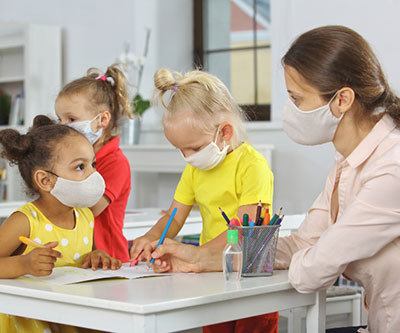
As the pandemic continues into its third year, NICHD continues to support and conduct research to understand the long-term effects of COVID-19 on pregnancy, child development, mental health, and more.
Earlier this year, NICHD-supported researchers reported that children born during the pandemic may experience slight neurodevelopmental delays regardless of whether their mothers had COVID-19 during pregnancy. These infants scored slightly lower on certain tests of neurodevelopment at 6 months of age, compared to a similar group of infants born before the pandemic. The findings suggest that children born during the pandemic may need long-term monitoring to rapidly identify and address any future lags in development.
A different NICHD-funded team found that youth suicides increased in the first year of the pandemic. Although the number and proportion of youth suicide varied among individual states, when all 14 states in the study were considered together, researchers observed an increase in the number of suicides among youth 10 to 19 years of age compared to the overall population. The findings highlight the need for mental health and suicide prevention services for young people to help meet the stresses of the pandemic, as well as expansion of bereavement counseling for those who lost caregivers to COVID-19.
NICHD-supported researchers also expanded our knowledge of the effects of COVID-19 on pregnancy. One study reported that pregnant women with COVID-19 appeared to be at greater risk for common pregnancy complications—in addition to health risks from the virus—than pregnant women without COVID-19. The study, which included nearly 2,400 pregnant women infected with SARS-CoV-2, found that those with moderate to severe infection were more likely to have a cesarean delivery, to deliver preterm, to die around the time of birth, or to experience serious illness from hypertensive disorders of pregnancy, postpartum hemorrhage, or infection other than SARS-CoV-2. They were also more likely to experience miscarriage or stillbirth, or to have an infant die during the newborn period. The findings underscore the need for women of reproductive age and pregnant women to be vaccinated and to take other precautions against becoming infected with SARS-CoV-2.
NICHD investigators also found that SARS-CoV-2 may cause fetal inflammation even in the absence of placental infection. They described unique maternal, fetal, and placental immune responses among pregnant women with COVID-19, including changes in antibodies, immune cell types, and inflammatory markers in maternal blood, umbilical cord blood, and placental tissues. The potential long-term effects of these inflammatory processes require additional study.
 BACK TO TOP
BACK TO TOP